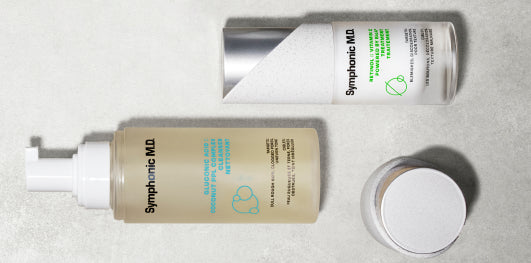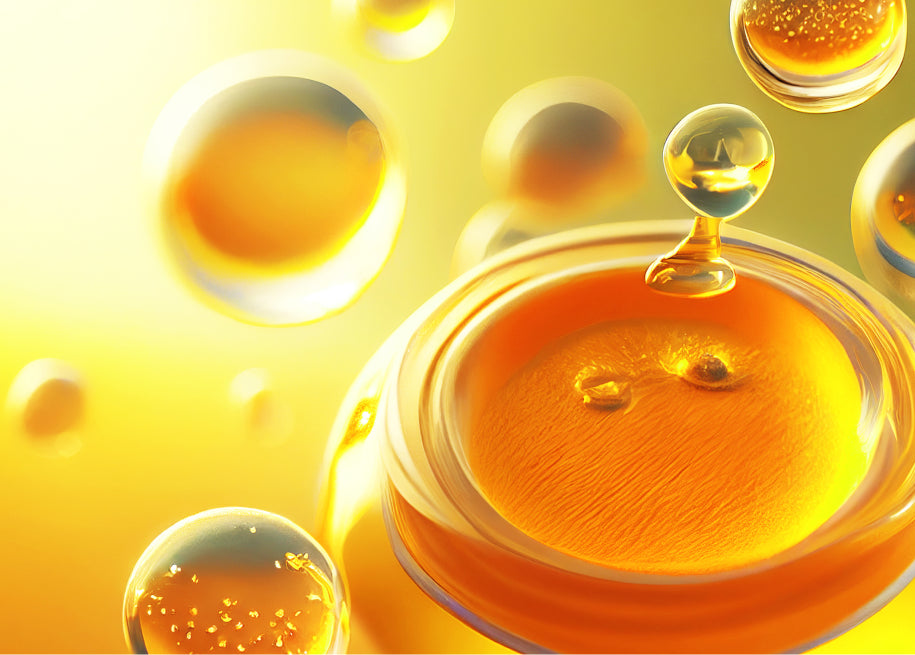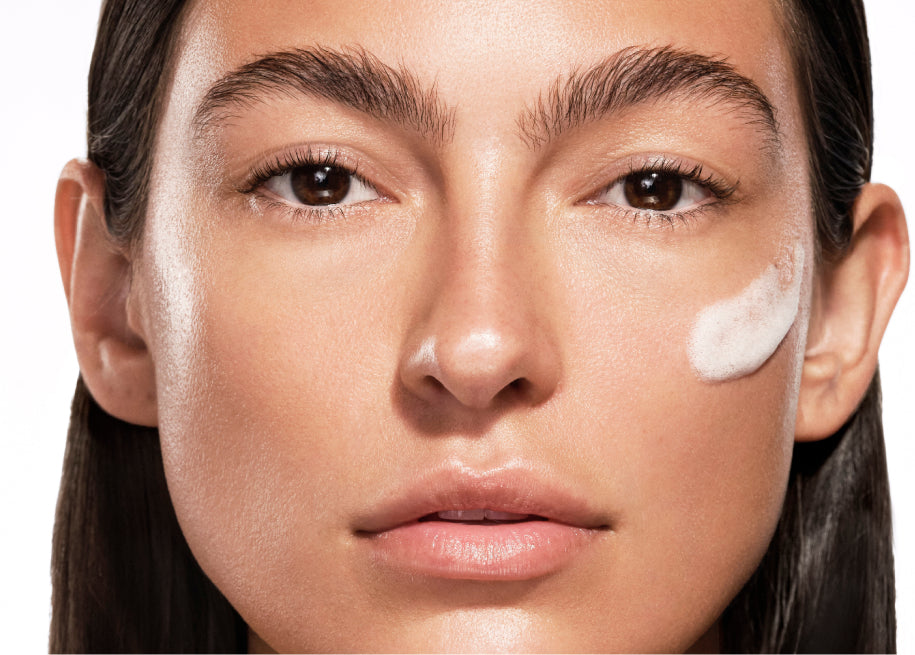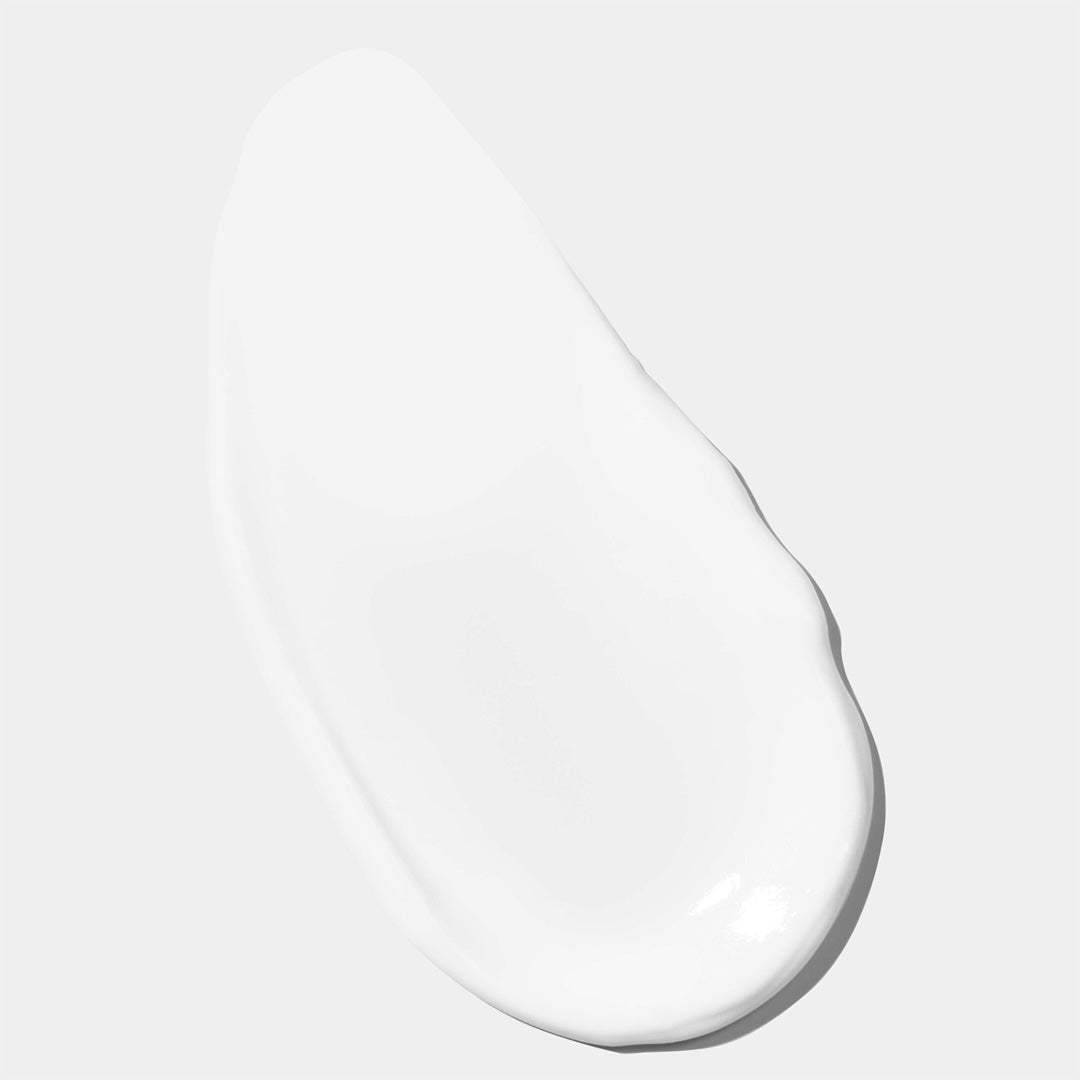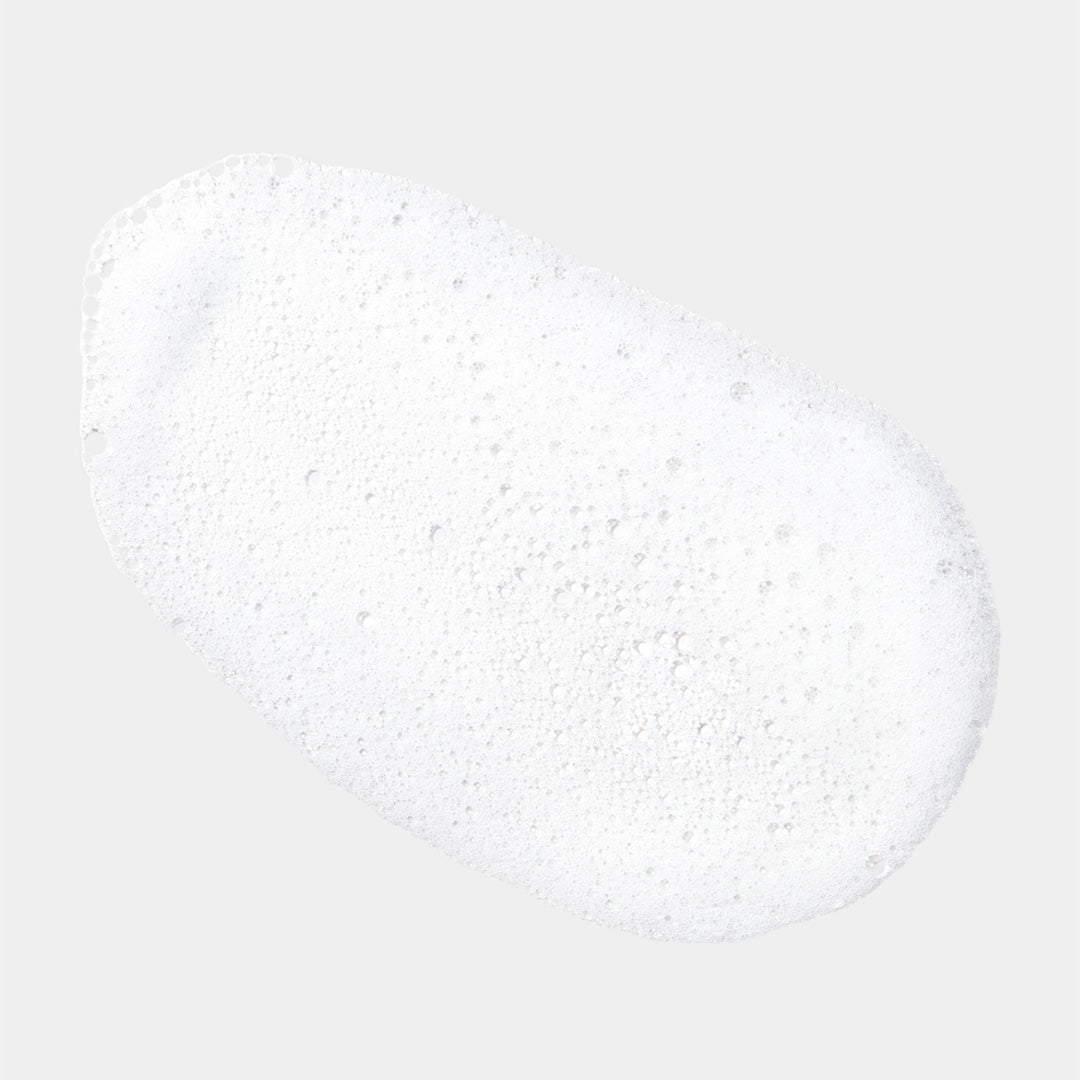To help you better understand your skin barrier, we’ll cover everything from what it is and how it works, to how you can repair and protect it.
What is a skin barrier?
Your skin barrier, also known as the “moisture barrier” or “acid mantle”, is the top layer of your skin. The anatomical term for this is the stratum corneum, and it’s made up of skin cells and a lipid interface that comprises fatty acids, cholesterol, and ceramides. The skin barrier is a watertight seal that ensures the outer layers of your skin are kept together. A healthy skin barrier results in soft, supple, and plump skin, while a damaged barrier can feel rough and dry.
Why is the skin barrier important?
The skin barrier is vital for normal body function. Physically, it protects you from anything potentially harmful. Internally, it helps to regulate the body and ensure you don’t lose too much water. Maintaining a healthy skin barrier is essential for well-hydrated, glowing, and even skin.
Without this layer of protection, environmental toxins and pathogens could penetrate the skin and potentially cause adverse effects within the body. If your skin barrier becomes damaged or impaired, it is unable to hold onto the vital substances that keep skin cells intact, leading to water loss and a more vulnerable surface.
The skin barrier is a watertight seal that ensures the outer layers of your skin are kept together.
The purpose of your skin barrier
The skin barrier’s main job is to protect the body from physical toxins such as pollution, harmful chemicals, ultraviolet radiation, and other harmful external factors. It also plays a role in keeping the good stuff within your body.
Each layer of your skin performs an important function within the body, with many components contributing to your skin’s makeup:
- Corneocytes – tough skin cells forming the ‘bricks’ of your skin
- Lipids – natural fats in the skin that fill the gaps between your corneocytes
- Keratinocytes – natural oils, ceramides, and cholesterol that create an impermeable wall
- Melanocytes – melanin-producing cells that absorb ultraviolet radiation
- Langerhan cells – cells responsible for helping the skin develop an immune response
How do you know if you have a healthy skin barrier?
When your skin barrier is in optimal condition, it effectively retains moisture and is supple and hydrated. It also helps to ensure a balanced microbiome, reducing the risk of breakout-causing bacteria.
External factors can also help you determine the health of your skin barrier. If your skin responds well to environmental changes, skincare products, or makeup, your skin barrier is likely to be in a good, resilient condition. If you experience irritation, redness, or adverse reactions to these factors, your skin barrier could be having a tough time.
What does a healthy skin barrier look like?
It’s possible to physically see the condition of your skin barrier. A healthy skin barrier will result in a clear, glowing, and radiant complexion. It’ll feel smooth to the touch thanks to the optimal moisture retention, and your skin tone will be more even.
Healthy skin barriers typically show very minimal signs of breakouts, rashes, redness, or inflammation. This is because they are effectively blocking irritants and harmful pathogens from damaging the skin.

A healthy skin barrier will result in a clear, glowing, and radiant complexion.
What can damage your skin barrier?
Unfortunately, there are several factors that can damage your skin barrier, many of which you’ll come into contact with every day. Some factors will result in minimal damage to the skin barrier, while others can have more harmful effects.
Some of the common things that can damage your skin barrier are:
- Pollution
- UV radiation
- Dry or humid environments
- Wind
- Smoking
- Stress
- Lack of sleep
- Poor diet
- Decreased ceramide levels as we age
- Health conditions such as diabetes
- Genetics
There are some more avoidable causes of damage to the skin barrier too, including:
- Using harsh chemicals or soaps
- Using cleansers that strip the skin’s natural oils
- Overusing exfoliating acids
- Using harsh exfoliants
- Not moisturizing
- Steroid use
- Psychological distress
A number of medical conditions can also contribute to a damaged or poor skin barrier, including dermatitis, rosacea, psoriasis, and ichthyosis.
If your skin barrier is damaged over a longer period, you could be more susceptible to other long-term skin conditions.
What does a damaged skin barrier look like?
It’s usually quite easy to tell if your skin barrier is damaged just by looking at it. The first tell-tale sign is dehydration, which is the result of an increased loss of water from the skin’s surface. This can make the skin look dry and dull, often with rough patches of skin.
If you’re not sure if your skin barrier is damaged, also consider the following:
- Is your skin reacting negatively to non-active products or environmental factors?
- Does the skin sting or burn?
- Do you have any redness or irritation?
If your skin barrier is damaged over a longer period, you could be more susceptible to other long-term skin conditions.
Signs of a damaged skin barrier
One of the main issues with a damaged skin barrier is water loss, and this can manifest itself in a variety of ways. This means it can be easy to see the signs of a damaged skin barrier. Some common signs for you to look out for include:
- Dehydrated, dull skin
- Acne
- Dry, scaly or flaky skin
- Inflammation and irritation
- Itchiness
- Rough patches
- Hyperpigmentation
- Skin infections
- Delayed wound healing
- Stinging when applying skincare products
- Sensitivity
- Rosacea or eczema caused by genetic defects in the skin barrier
Are some skin types more vulnerable to skin barrier damage?
While damage to the skin barrier can affect anyone, there are a few skin types that are more susceptible. First are those with sensitive skin, closely followed by dry skin types. It’s important for people with these skin types to be more careful and add even greater protection to keep the skin barrier healthy.
How to prevent skin barrier damage
We all know that prevention is better than cure, and that’s definitely true when it comes to protecting your skin barrier. A strong and healthy skin barrier is essential for maintaining the overall appearance and health of the skin. Being proactive in how you look after your skin can prevent the risk of damage and help you maintain radiant, resilient skin.
Stay hydrated
Our body is 60% water, which means it’s vital for both our bodily functions and maintaining that protective outer layer. Ensuring you have an adequate water intake every day will improve your skin’s elasticity, resulting in plump and radiant skin.
Well-hydrated skin prevents the premature breakdown of the skin barrier, meaning you’re less likely to succumb to irritation, cracks, dryness, and blemishes. Not a big water drinker? Opt for foods with high water content such as oranges, watermelons, and cucumbers instead.
Eat a healthy diet
While eating is something we must do to survive, what you put into your body has a direct impact on your skin. Opting for a balanced diet rich in antioxidants, vitamins, and essential fatty acids can help to support a healthy skin barrier.
You should also aim to consume foods rich in Omega-3s, like walnuts and fatty fish, to maintain the lipid balance in the skin. And don’t forget the vitamins. Foods with high vitamin A, C, and E contents, like leafy greens, nuts, and berries, offer antioxidant protection which shields the skin from free radical damage.
Well-hydrated skin prevents the premature breakdown of the skin barrier.
Practice good skin care
Ensuring you follow a consistent skincare regime is also important. Pay attention to the products you’re putting on your skin and make sure they’re developed specifically for your skin type.
Dry or sensitive skin types should choose gentle cleansers and creamy moisturizers that effectively protect your skin barrier. While oily skin types would benefit from a facial wash ahead of a cleanser to fully remove any pollutants.
Manage stress levels
It’s often easier said than done, but maintaining low stress levels can really help your skin. Chronic stress has been proven to negatively impact skin health. This is because elevated stress levels can result in hormonal imbalances, meaning your skin’s ability to repair and regenerate is impaired.
Try to avoid high-stress situations and take proactive steps to manage your stress levels. You could try relaxation techniques such as yoga, deep breathing, or meditation. And don’t underestimate the importance of a good night’s sleep, as this is the time when your skin naturally repairs and rejuvenates.
Can a damaged skin barrier be repaired?
The skin has an innate ability to heal and rejuvenate itself, and quickly too. The key to repairing damage is to change habits that will be better for your skin. This could include adding a consistent and healthy skincare regimen or making lifestyle changes.
Your skin regenerates itself every 27 days, on average, but if your skin is particularly badly damaged, it could be three to four months.
A combined approach delivers the best results, but persistence is key. If you’ve started using more nourishing products, and you’re avoiding external factors that damage your skin, you might see some improvement. But be careful not to give up as soon as you see results, as this could mean your skin reverts back to its damaged state if you don’t see it through.
As humans, it typically takes an average of 66 days to form a habit, which is a great target to aim for when repairing your skin barrier. You’ll be more likely to continue with the changes, preventing future skin damage and repairing previous damage.
How long does it take to repair your skin barrier?
The time it takes to repair your skin barrier will depend on several factors, such as your skin type and the level of damage. Your skin regenerates itself every 27 days, on average, but if your skin is particularly badly damaged, it could be three to four months before you see a significant improvement. It’s important that you remain consistent and keep working towards your goal of hydrated, healthy skin to see the full results.
Can your skin barrier be permanently damaged?
Our skin is forever changing, so permanent skin barrier damage is rare. Some medical conditions can cause long-term damage but most of us are unlikely to experience this. What can happen though, is our skin barrier can take longer to repair.
One such case is with aging skin. As we get older, our skin barrier is unable to replace itself as quickly as when we were younger, and we start to lose collagen. When this happens, it’s time to use age-appropriate products that target specific issues.
How to repair your skin barrier
Repairing your skin barrier requires a holistic approach that includes lifestyle changes, gentle skincare products, and active ingredients that target our concerns. Each of these speeds up the process and restores radiance and resilience to the skin. Here are some skincare tips for skin barrier repair.

Use a gentle face cleanser
When your skin is damaged, particularly from external pollutants or environmental factors, it’s essential that you remove all remnants of pollution from the skin. A cleanser is the go-to product for this.
Start by choosing a gentle face cleanser that removes both makeup and other impurities, without stripping the skin. The kindest cleansers for damaged skin will promote a balanced skin environment that allows the healing process to start without disruption. They are usually sulfate-free and fragrance-free, with a pH-balanced formula. This ensures the cleanser effectively cleans the skin without causing irritation or worsening the damage.
Our Gluconic Acid :: Coconut PPL Complex Cleanser is mild and soap-free, offering a calming cleansing experience that helps to clean and hydrate damaged skin. Its calming antimicrobial formula targets dull skin, clogged pores, and uneven tone – gently shedding cells while strongly stimulating barrier repair to leave skin soft and purified.
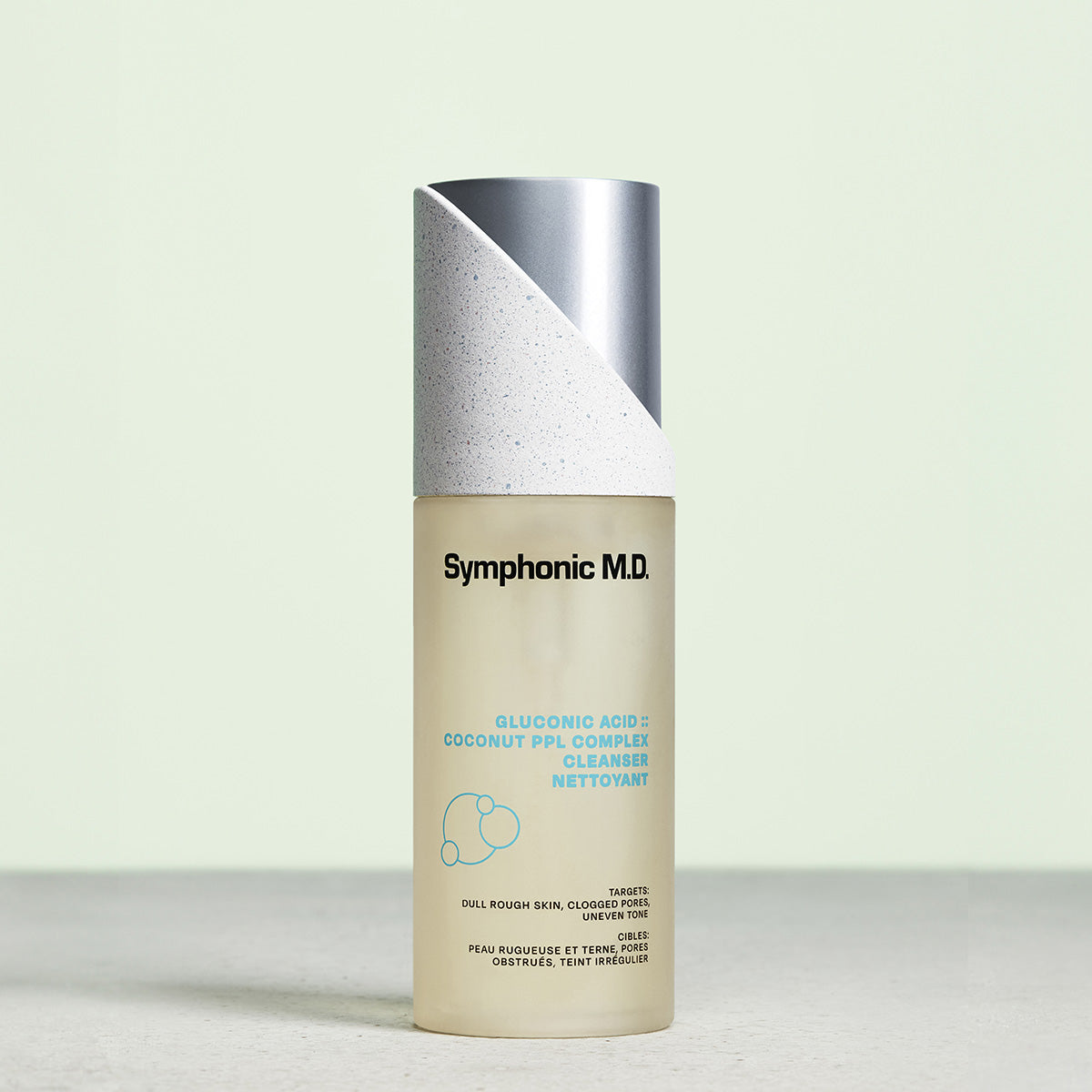
Gluconic Acid :: Coconut PPL Complex
This calming antimicrobial formula targets dull skin, clogged pores, and uneven tone — gently shedding cells while strongly stimulating barrier repair to leave skin soft and purified.
Not sure about using a cleanser on damaged skin? Learn everything you need to know about how cleansing your skin regularly can have a positive impact on protecting your skin barrier in our comprehensive guide: What Is A Cleanser & What Does A Face Cleanser Do For Your Skin?
Use a serum or moisturizer designed with your skin barrier in mind
Many of us use serums and moisturizers with active ingredients in our skincare routine, but it’s important to choose products that are specially designed to support and rejuvenate the skin barrier. This doesn’t mean you need to chuck out your acids or retinol, but you should be more mindful about balancing the ingredients and ensuring they are benefitting you.
Serums and moisturizers designed to hydrate and restore are essential for repairing a damaged skin barrier. When looking for products to support you in this step, you should seek out ingredients like ceramides, fatty acids, and cholesterol. These ingredients will replenish the lipids in the skin, preventing transepidermal water loss and bolstering the barrier.
Additionally, products with anti-inflammatory properties or soothing ingredients can help to reduce any redness and irritation. Niacinamide and aloe vera are good examples.
Use a multifaceted moisturizer
Moisturizer is a critical part of any skincare routine, but if you’re aiming to repair a damaged skin barrier, you should use a multifaceted moisturizer that combines hydration, nourishment and protection. Products that include humectants, such as hyaluronic acid and glycerin, can attract and bind water to increase the skin’s water content.
Well-formulated moisturizers that target a multitude of issues can alleviate any damage-induced dryness, but also deliver the optimal environment for barrier repair. Products rich in antioxidants, like green tea and vitamin E, can also be beneficial as they offer protection against environmental factors.
Our Retinol :: Vitamin C Powered by BioA3 Treatment moisturizer is a great option if you’re looking for a combination product.
Emollients are another vital moisturizer ingredient, designed to soften the skin and aid in repairing dryness. Emollients contain several familiar ingredients including mineral oil, petroleum jelly, cocoa and shea butters, grape seed and jojoba oils.
Incorporate retinol & Vitamin C into your skin care routine
Retinol and vitamin C both have unique advantages when it comes to skincare. Known for increasing cell turnover and boosting collagen production, retinol can help to renew the skin and strengthen its structural integrity. Vitamin C is an antioxidant with collagen-boosting properties that help to brighten and protect the skin.
However, the magic happens when the two work together. The synergy between these products accelerates skin barrier repair and restores the skin to optimal health. When using the two products in your skincare routine, it’s important to add them gradually. Active ingredients have a variety of effects on the skin, so always monitor your skin response to the new products and adjust your use accordingly.
Our Retinol :: Vitamin C Powered by BioA3 Treatment moisturizer is a great option if you’re looking for a combination product. Its super-smart formulation helps to clear bacteria, reduce blemishes, and smooth skin texture. This moisturizer has successfully combined these powerful ingredients into a stable skincare product – a first for the industry. Our proprietary BioA3 ensures the stability, enhancement, and efficacy of the retinol and vitamin C while serving as a shield to protect against adverse reactions.
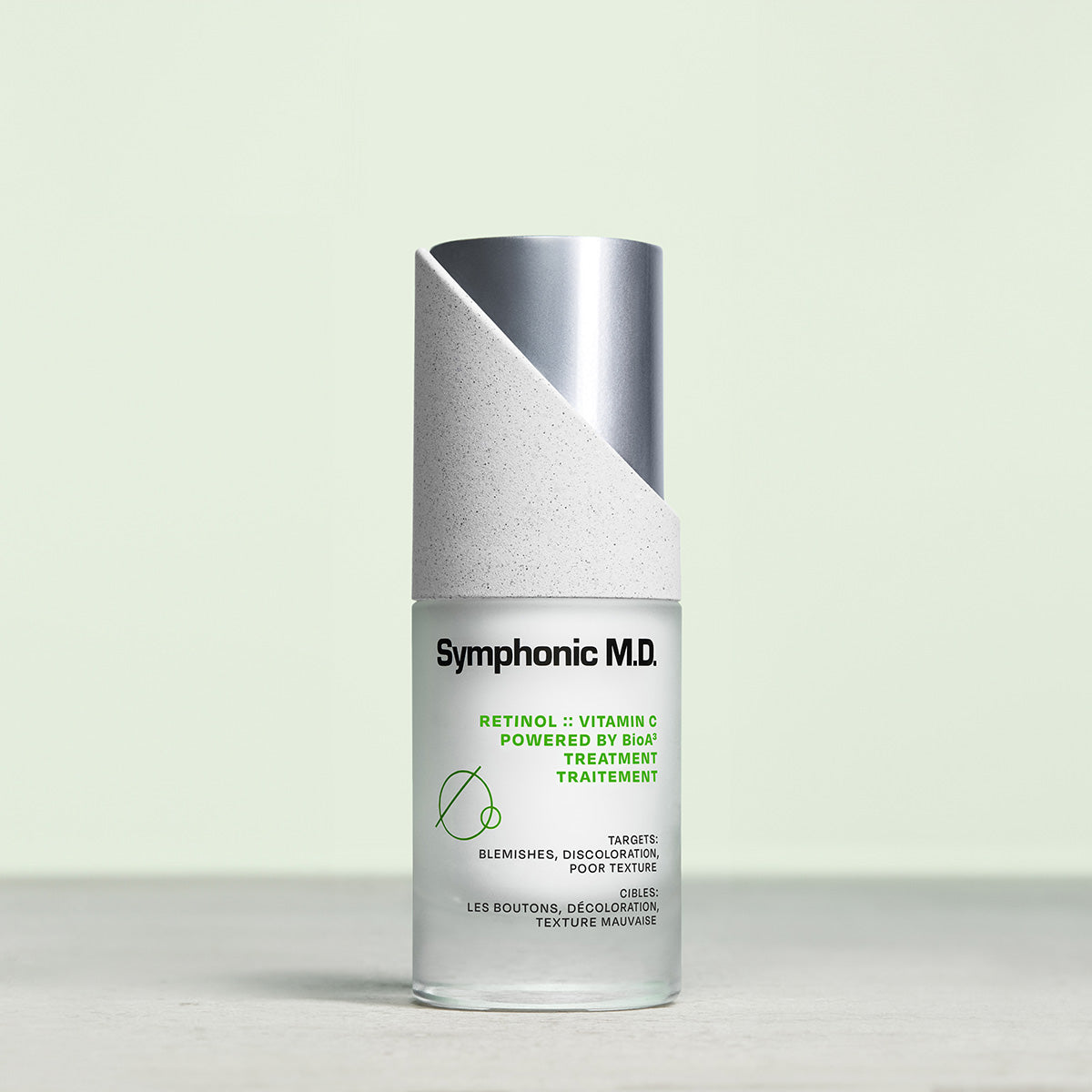
Retinol :: Vitamin C
This anti-inflammatory serum powered by BioA3 targets blemishes, tone, and texture — helping to clear bacteria and smooth skin without clogging pores.
How to know if your skin barrier is healed
Determining whether your skin barrier is healed is as simple as observing the feel and appearance of your skin. The first thing you’ll notice is any redness, inflammation, dryness or irritation is reduced. Following this, the skin will start to improve, resulting in plumper and more elastic skin that better retains moisture.

When your skin barrier is repaired, it will feel comfortable and free from persistent sensations of dryness, irritation, or tightness. It will look more radiant too – a tell-tale sign of healthy skin. A functioning and repaired skin barrier will also start to do its job of protecting against irritants again. When this happens, you should experience less reactions, like breakouts or skin sensitivity.
Whether you’ve just started repairing your skin, or you’ve been on the journey for a while, you should regularly assess the condition of your skin to determine the state of your skin barrier. Monitor how it responds to environmental changes and products, and adjust your skincare routine accordingly.
How to maintain a healthy skin barrier
Once you’ve repaired your skin barrier, you’ll want to maintain the results and keep up the effort you’ve put in. Consistent maintenance is essential for long-term skin health and building up that resilience and protective barrier.
Look for gentle formulas with balanced ingredients that are free from fragrances, alcohol, and harsh surfactants.
Maintaining your skin barrier successfully lies in your ability to strengthen it. When it comes to skincare, look for products that include barrier-strengthening ingredients like ceramides, fatty acids, and peptides. It’s also essential that you use mild cleansers that won’t strip the skin, and avoid abrasive scrubs that could cause damage.
Other ways to strengthen your skin barrier include avoiding fragranced products, protecting your skin from the sun, and using active ingredients carefully. For example, applying the highest strength of an ingredient can irritate your skin unnecessarily, so only use products when you have established the right concentration and frequency for your skin.
In order to maintain healthy skin, use products that are designed to protect the skin barrier. Look for gentle formulas with balanced ingredients that are free from fragrances, alcohol, and harsh surfactants. Hydrating and nourishing ingredients like hyaluronic acid, glycerin, niacinamide, and antioxidants are all key for skin maintenance.
Basic skincare routine for a damaged skin barrier
While you may already have an established skincare routine in place, you might need to consider making changes if your skin barrier requires repair. Your skincare routine should be pared back to basics to avoid any further aggravation or damage.
Wash your face with warm water
When washing your face, it’s important to use lukewarm water. This is because hot water can cause further damage to the skin barrier and strip the skin of its natural oils. This can lead to dryness and irritation which will not help your already damaged skin barrier.
Use a soap-free cleanser
While many soaps are marketed as ‘irritant-free’, the truth is that soap is harsh and can strip the skin of its natural oils, while also washing away good bacteria. Mild, soap-free cleansers like our Gluconic Acid :: Coconut PPL Complex Cleanser are the better option for washing your face.
Don’t over-cleanse
Cleansing is good for the skin, but overdoing it can have the opposite effect. You want to cleanse your face until each area has been covered, then wash off with lukewarm water.
Gently exfoliate
If your skin barrier damage is fairly mild, it’s ok to gently exfoliate the skin. But if the damage is more severe, you should avoid exfoliating altogether. If you are exfoliating, opt for gentle products that aren’t too abrasive on the skin. You should avoid using chemical or physical exfoliants that include retinol, AHAs, or BHAs for a few weeks if your skin barrier is badly damaged.
Keep your skin’s pH balanced
You’ve probably heard about the skin’s pH levels in relation to skincare products, but understanding them is key to creating a healthy skin barrier. pH stands for “potential hydrogen” and the pH number indicates how acidic the skin is. Our skin usually has a normal pH of 5.5 – anything higher or lower means your skin could need some TLC. To establish the pH of your skin, speak to a dermatologist.
Hydrating and nourishing ingredients like hyaluronic acid, glycerin, niacinamide, and antioxidants are all key for skin maintenance.
Keep your skin moisturized
Damaged skin barriers typically result in dry, dehydrated, and rough skin, so moisturizing is vital for repairing damage and reversing these effects. Look for gentle, hydrating moisturizers that are free from any irritants or harsh chemicals that could further damage the skin. Use your moisturizer regularly to alleviate dryness and irritation, carefully monitoring the effects your product is having on the skin.
Wear sunscreen
Whether it’s the middle of summer or the beginning of winter, protecting your skin from UV radiation is always important, especially when you have a damaged skin barrier. Opt for at least a factor 30 sunscreen and apply liberally to your face every day.
Treat acne with care
If you suffer from acne, or your damaged skin barrier has resulted in a breakout, it’s important that you treat it carefully. While it’s tempting to pick and pop pimples, this is the last thing you should do. Messing with your acne causes trauma to the skin, resulting in inflammation, infection, and acne scars.
The bottom line
Our skin barrier is essential for protecting us from harmful environmental factors and keeping the skin hydrated and healthy. But it can’t do all the work alone. Whether you’re looking to prevent damage to your skin barrier or you need help repairing it, our guide should have gone some way in getting you started on your journey to a healthy skin barrier.
FAQs
Should I exfoliate if my skin barrier is damaged?
If your skin barrier is damaged, you need to assess the level of damage before applying an exfoliator to the skin. Minimal damage can handle gentle exfoliators like PHAs, but if the damage is more severe, you should steer clear of exfoliators altogether.
Can you heal your skin barrier without products?
To fully heal a damaged skin barrier, you should take a combined approach using products and making lifestyle changes. If you don’t want to add more products to your skin, it’s a good idea to start by ensuring you’re eating a healthy diet that includes healthy fats, antioxidants, and trace minerals.
The skin is pretty good at healing by itself, without intervention, but to speed up the process, it’s always worth considering some targeted skincare products.

